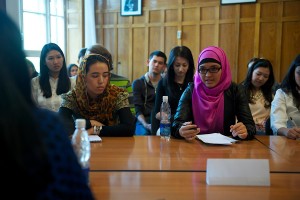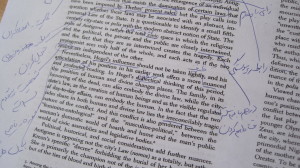 I had dinner with a friend last week; she is about 20 years younger. We were next door neighbors a while back, and a friendship bloomed between us even though a generation separates us. She is radiant and thoughtful, and our friendship continues the way it began—unedited candor and shared problem solving about whatever our hearts grapple with.
I had dinner with a friend last week; she is about 20 years younger. We were next door neighbors a while back, and a friendship bloomed between us even though a generation separates us. She is radiant and thoughtful, and our friendship continues the way it began—unedited candor and shared problem solving about whatever our hearts grapple with.
As we traded details of our work and love lives, talk turned to mentors, older women in who had bumped into our lives and inspired us. That inspiration became a soft-focus teaching that guided us and helped us find our footing.
I spoke of Lorna, my first mentor.
I was in my early 30s when I joined the animal kingdom of academia after spending my 20s consorting with the rogues who constitute a newsroom. My department at the university was largely white, largely male, largely middle-aged and wholly constructed as a food chain with women on the lower rungs. This sort of baroque and dude-dominated ecosystem wasn’t particular to academia, but the prevalence of pointy heads and arcane research added a dimension of ridiculousness when the jostling began among the alpha males.
There were a few women in the department, not many, and Lorna cut a fierce figure. What I was drawn to most was her unwavering moral compass, always pointing toward the true north of justice. She did so without sanctimony or finger pointing. She didn’t aim to please, she aimed to do right. I didn’t sit at her feet as much as I absorbed her. I listened to her reason at faculty meetings, watched the way she engaged with students, paid close attention to her manner of moving through the world.
And she paid attention to me. In the force field of her attention I felt seen, nurtured and guided. Her mentoring furthered me, encouraging me onward.
I’m not one for mentoring programs; they feel too much like blind dates. I prefer mentoring built on organic chemistry and the philosophy of Lao Tsu: When the student is ready, the teacher will arrive. I think of the women who have mentored me and the women I’ve mentored. The relationships are based on gravitational pull, serendipity and proximity rather than a matrix. Mentoring—and being mentored—cement my citizenship in sisterhood.
After I spoke of Lorna, I thought of Benazir. I met her last year when I was teaching in Kyrgyzstan at the American University of Central Asia. Walking the halls of AUCA felt like moving through an international airport peopled almost entirely by savvy 20-somethings. Jeans and T-shirts and backpacks, faces bearing traces of Asia, the Middle East, Russia. Cultures mashed, country borders blurred, languages curling into one another. Cellphones as centerpieces.
I met Benazir when I walked into the first day of a news reporting class that had only six students on the roster: one from Nepal, one from South Korea and four from Afghanistan. The four Afghanis were female; three wore hijabs and had left their country for the first time a week before to come to Kyrgyzstan and attend university on scholarships. They bore solemn expressions and held their hands in their laps. When I spoke to them, their eyes remained downcast. Their voices were feathery and barely audible. Except for Benazir.
Benazir had a solid presence to her and a sly sense of humor beneath her propriety. She sought my opinion and grappled eagerly with the concepts of truth pursuit, fact checking and questioning that I presented in class. I saw her watch my manner of moving through the world.
Midway through the semester, a mid-level State Department diplomat visited to talk about Central Asian politics and U.S. policy. She came to our university and requested journalism students in the audience because she wanted something close to a press conference. I made it a class assignment.
 Benazir threw herself into preparation. She came to my office with research in hand. She asked to practice her questions. When I encouraged her to actively listen and be prepared with follow-up questions, she said, “I have never done such things.”
Benazir threw herself into preparation. She came to my office with research in hand. She asked to practice her questions. When I encouraged her to actively listen and be prepared with follow-up questions, she said, “I have never done such things.”
On the day of the press conference Benazir was waiting at my office door in a hot pink hijab, her notebook clutched in her hand. She arrived an hour early at the site to score the seat closest to the speaker. She sat with her spine erect and took notes furiously. As the floor was open, she shot up her hand and was called upon first. She laced her questions with facts about graduation rates and asked the diplomat about the education of young women in Afghanistan.
As the answer spooled on, Benazir caught my eye for a moment and hinted at a self-satisfied smile. I thought of Lorna and the interlocked line of women who have stepped in and stepped up to help show younger women a way. Not the way; that’s for each of us to piece together on our own. But a way to be in this world that we take in and then pass along to the next one, whomever she may be.

